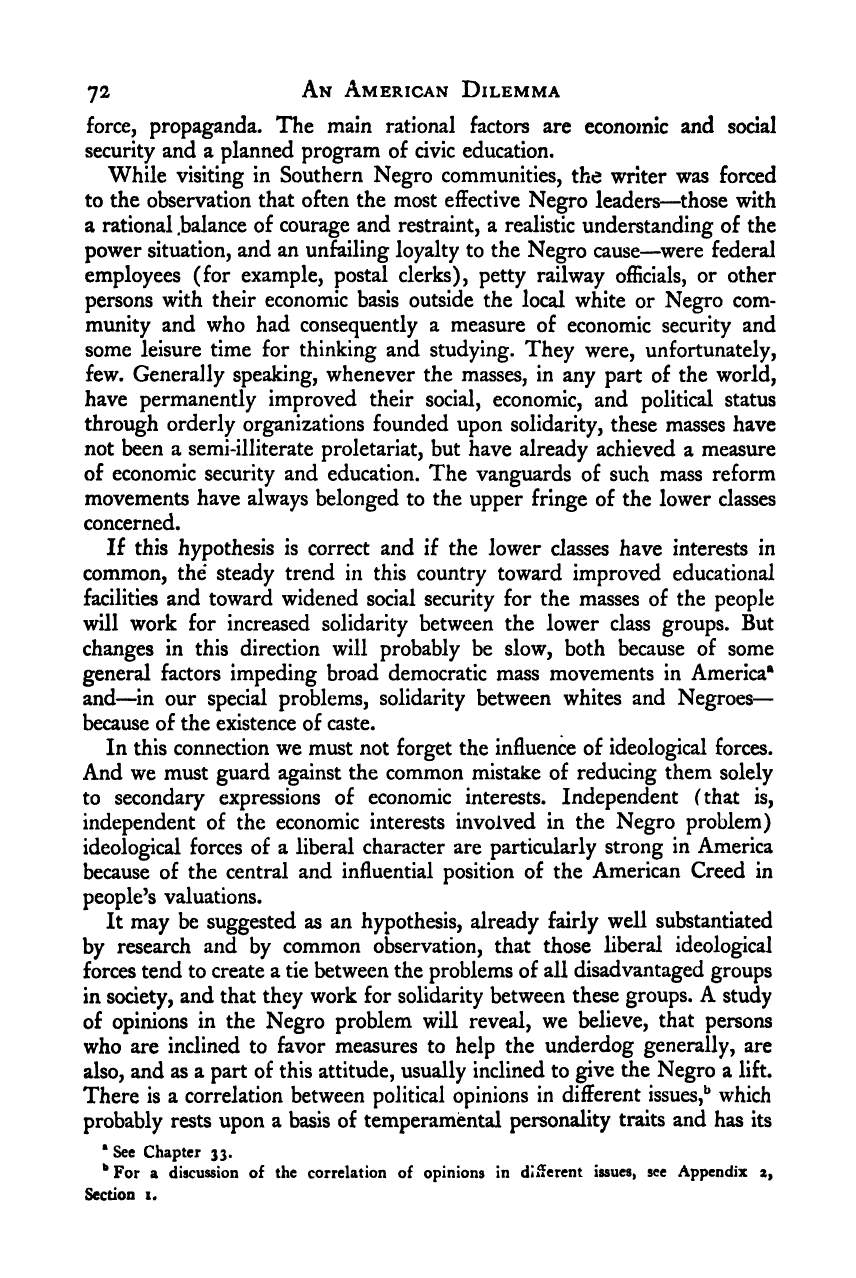Note: Gunnar Myrdal died in 1987, less than 70 years ago. Therefore, this work is protected by copyright, restricting your legal rights to reproduce it. However, you are welcome to view it on screen, as you do now. Read more about copyright.
Full resolution (TIFF) - On this page / på denna sida - I. The Approach - 3. Facets of the Negro Problem - 5. Relationships between Lower Class Groups

<< prev. page << föreg. sida << >> nästa sida >> next page >>
Below is the raw OCR text
from the above scanned image.
Do you see an error? Proofread the page now!
Här nedan syns maskintolkade texten från faksimilbilden ovan.
Ser du något fel? Korrekturläs sidan nu!
This page has never been proofread. / Denna sida har aldrig korrekturlästs.
72 An American Dilemma
force, propaganda. The main rational factors are economic and social
security and a planned program of civic education.
While visiting in Southern Negro communities, the writer was forced
to the observation that often the most effective Negro leaders—^those with
a rational .balance of courage and restraint, a realistic understanding of the
power situation, and an unfailing loyalty to the Negro cause—^were federal
employees (for example, postal clerks), petty railway officials, or other
persons with their economic basis outside the local white or Negro com-
munity and who had consequently a measure of economic security and
some leisure time for thinking and studying. They were, unfortunately,
few. Generally speaking, whenever the masses, in any part of the world,
have permanently improved their social, economic, and political status
through orderly organizations founded upon solidarity, these masses have
not been a semi-illiterate proletariat, but have already achieved a measure
of economic security and education. The vanguards of such mass reform
movements have always belonged to the upper fringe of the lower classes
concerned.
If this hypothesis is correct and if the lower classes have interests in
common, the steady trend in this country toward improved educational
facilities and toward widened social security for the masses of the people
will work for increased solidarity between the lower class groups. But
changes in this direction will probably be slow, both because of some
general factors impeding broad democratic mass movements in America*
and—in our special problems, solidarity between whites and Negroes
—
because of the existence of caste.
In this connection we must not forget the influence of ideological forces.
And we must guard against the common mistake of reducing them solely
to secondary expressions of economic interests. Independent (that is,
independent of the economic interests involved in the Negro problem)
ideological forces of a liberal character are particularly strong in America
because of the central and influential position of the American Creed in
people’s valuations.
It may be suggested as an hypothesis, already fairly well substantiated
by research and by common observation, that those liberal ideological
forces tend to create a tie between the problems of all disadvantaged groups
in society, and that they work for solidarity between these groups. A study
of opinions in the Negro problem will reveal, we believe, that persons
who are inclined to favor measures to help the underdog generally, are
also, and as a part of this attitude, usually inclined to give the Negro a lift.
There is a correlation between political opinions in different issues,^ which
probably rests upon a basis of temperamental personality traits and has its
• See Chapter 33.
* For a discussion of the correlation of opinions in different issues, sec Appendix a,
Section 1.
<< prev. page << föreg. sida << >> nästa sida >> next page >>